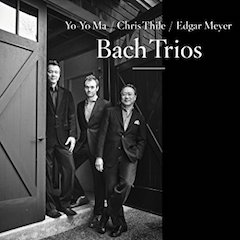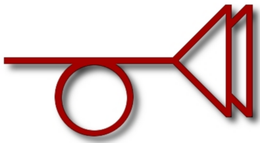
(from left) Chris Thile, Yo-Yo Ma and Edgar Meyer: ‘,,,we feel very strongly about each piece,’ says Meyer, ‘and they are all very challenging, in different ways.’

BACH TRIOS
Chris Thile/Yo-Yo Ma/Edgar Meyer
Nonesuch
An album that elicits a considerable amount of excitement, the new “Bach Trios” album with Yo-Yo Ma, Chris Thile, and Edgar Meyer is an instant classic and a must listen.
Bach albums are a dime-a-dozen. Articles about Bach albums that begin with statements referencing the vast volume of Bach albums in the world are also a dime-a-dozen. Less common, though, is a Bach album like this.
Cellist Yo-Yo Ma, mandolinist (and MacArthur Genius Grant winner) Chris Thile, and bassist (and fellow Genius Grant winner) Edgar Meyer have played together for decades, each known for their superlative talent and wide-ranging musical interests. What makes this new Bach album unique is that it, like them, is infused with a healthy dose of non-classical pedigree. …
The result of this multifaceted group playing Bach is an album that cannot be pigeon-holed. It is willing to color outside the lines. There is no question that a shared reverence and awe for Bach’s genius flows through the project, but there is also a casualness, making this album closer to “Bach for the back porch” than “Bach for the concert hall” (or museum). The album is never sloppy, but there is a swing to the playing that is Bach unapologetically untethered.
Whether your library overflows with Bach albums, or this is your first one, you will not be disappointed in adding it to your collection. —Chris Voss, “Classical Music with Chris Voss” at WCRB Boston
Wachet auf, ruft uns die Stimme, BWV 645, Yo-Yo Ma/Chris Thle/Edgar Meyer, from Bach Trios
***
‘…it has neither beginning nor end…’
Hard to know whether to give this confection one star or five. The dominant voice is the mandolin of Chris Thile, an instrument probably unknown to J S Bach who never wrote for it, but used often in modern transcriptions of his works. It sits more comfortably in a Bach score than, say, a tenor sax, but that does not make it remotely authentic.
The other instruments at play here are a cello and double bass. What hits the ear from the off are clever, virtuosic trio adaptations of anything from a solo keyboard fugue from the Well-Tempered Clavier to an aria from the St Matthew Passion, and all things in between.
The intuition of these three musicians is so quick and the empathy so strong that one quickly ignores Bach’s original intentions and revels in the busy interactions between Meyer, Thile and Ma. The aria “Ich uf zu Dir,” reduced to trio size, becomes all the more personal and “Erbarme Dich”’ is almost a whispered supplication.
But once the surprise soon wears off the record winds down into business-lounge music, background noise so inoffensive you barely notice when it’s over since it has neither beginning nor end. Expect this to be played at many dinner parties over the coming year. Astonish your friends by recognizing it. —Norman Lebrecht, Lebrecht Weekly, March 24,2017
Sonata No. 6 in G Major, BWV 530: 1. Vivace, Yo-Yo Ma/Chris Thile/Edgar Meyer, from Bach Trios
***
‘…precision that only comes from perfectionism…’
To choose just the right pieces from Bach’s massive catalog, Meyer says that they relied on instinct, as well as looking at “pieces that were conceived in three voices” adding that none of the pieces on the album were composed for three instruments. “In general the pieces are not arranged,” Meyer adds, “but are chosen in such a way that we can play them without altering any notes.”
The new energy that Thile, Ma and Meyer bring to centuries-old music is palpable. In a video of the barn sessions, Thile counts off one of Bach’s sonatas as if the trio were about to launch into a rock anthem. They juggle the counterpoint between them with ease, bringing both warmth and technical precision to their performance.
It’s a precision that only comes from perfectionism. As the three musicians come to the end of a flawless performance of the trio, Meyer chimes in. “Two or three like that,” he says, to which Thile nods in agreement: “let’s do two or three like that.” Watching them, it’s clear that they enjoy playing together immensely. Ma, who has giggled on the other side of the room, joins the dialogue. “Let’s do, like, five or ten or something like that.” —from “Chris Thile, Edgar Meyer and Yo-Yo Ma Found Common Ground in Bach (In a Barn),” by Kara McLeland, April 24. 2017, All Things Considered, Nashville Public Radio
The Well-Tempered Clavier, Book II: Fugue No. 20 in A Minor, BWV 889, Yo-Yo Ma/Chris Thile/Edgar Meyer, from Bach Trios
***
‘I feel I owe Bach deference like no other musician’: Edgar Meyer on Bach Trios
(Excerpt from an interview by David Templeton posted at Strings, May 8, 2017
This is certainly not the first attempt to refashion Bach to meet the requirements of alternative instrumentation. But when combined with the challenging breadth of compositions chosen for this recording—including selections from The Art of the Fugue and The Well-Tempered Clavier—it’s hard to think of any other Bach trio project quite as daunting. Asked how the team came to choose these 17 compositions, Meyer allows that with a catalogue as vast as Bach’s, it was no easy task.
“Most importantly, we looked primarily at pieces that were originally in three parts,” he says, adding, “although I don’t think that we chose any that were originally for three instruments.”
According to Meyer, he presented an “overview of options” to Ma and Thile early on, and Bach scholar Christoph Wolff was brought in, as Meyer explains it, “to help make sure that we were more fact than fiction.”
After that, the three musicians sat together and read through a number of possible pieces, working to form a balanced program of music that all three of them loved.
“It was not difficult in any way,” Meyer says, “except that we could have put together six of these programs almost as easily as one.”
Art of the Fugue, BWV 1080: Contrapunctus XIII a 3, ‘Rectus,’ Yo-Yo Ma/Chris Thile/Edgar Meyer, from Bach Trios
Meyer offers that there were not any pieces the trio felt particular urgency to include, or that they found especially difficult to adapt to their skills and instruments. “There really is not a piece that stands out from the others,” he says, “either in terms of how strongly we felt about including it, or the degree to which it challenged us. Which is to say, we feel very strongly about each piece, and they are all very challenging, in different ways.”
Any adaptation of a known piece of work—especially those as revered and cherished as works by Bach—is open to criticism for daring to veer from the great composer’s original vision. Meyer suggests that he, Thile and Ma all instinctively understood this, and that Bach’s legacy was never in danger during the recording of Bach Trios.
“Bach is my personal favorite musician of all time,” he lets it be known, “and I feel I owe him deference like no other musician. If I can be convinced that Bach would have wanted it a certain way, then that is what I want to do. However, that is not the same as a historical argument [about how] it was done in a particular manner during his lifetime. We live in a different world with a different set of musical references, and it is probably not possible to hear music in exactly the way that it was heard in his lifetime. So we play it in a way that is true to our understanding, and try every day to broaden that understanding.”



